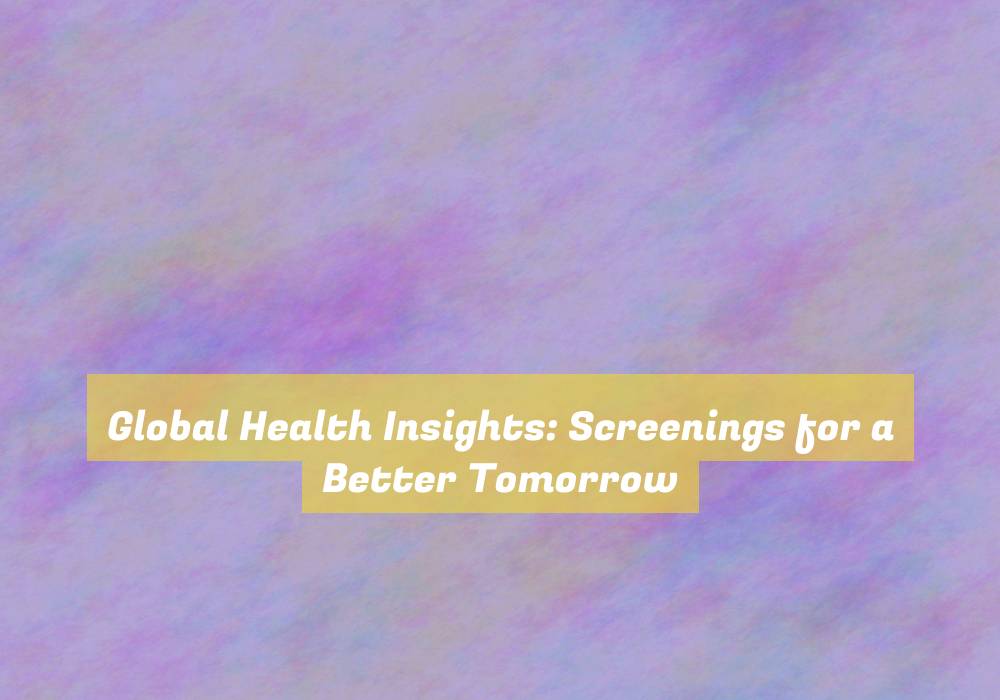Global Health Insights: Screenings for a Better Tomorrow
Imagine global health screenings as the lighthouses guiding ships through treacherous waters, helping to detect potential health threats before they become insurmountable.
In todayG??s interconnected world, the insights gained from these screenings are crucial in shaping a healthier future for all.
From the impact on public health to the advancements in screening technologies, the landscape of global health is constantly evolving.
As you explore the intricacies of this vital topic, youG??ll uncover the far-reaching implications and the ongoing efforts to overcome the challenges that lie ahead.
Importance of Early Detection
Detecting health issues early can significantly improve treatment outcomes and overall prognosis. By undergoing regular screenings, you can catch potential health problems before they progress to a more advanced stage. This proactive approach allows for timely intervention, increasing the effectiveness of treatments and minimizing potential complications.
For example, routine mammograms can detect breast cancer in its early stages, when itG??s most treatable. Similarly, blood pressure screenings can identify hypertension before it causes damage to vital organs. Early detection not only enhances the chances of successful treatment but also reduces healthcare costs associated with managing advanced diseases.
Furthermore, early detection empowers you to take control of your health. Knowing about a condition in its early stages provides an opportunity to make lifestyle changes and seek necessary medical interventions. This proactive stance can lead to better health outcomes and a higher quality of life.
Regular health screenings are essential for maintaining overall well-being and addressing potential health concerns before they escalate. Make early detection a priority and take charge of your health today.
Impact on Public Health
Regular health screenings have a significant impact on public health, promoting early intervention and reducing the burden of advanced diseases. By identifying health concerns at an early stage, screenings allow for timely medical intervention, leading to better treatment outcomes and reduced healthcare costs. Additionally, screenings play a vital role in preventing the spread of infectious diseases within communities. Early detection of communicable illnesses enables prompt isolation and treatment, thereby limiting their transmission to others.
Furthermore, public health initiatives, such as mass screenings for conditions like diabetes, hypertension, and certain cancers, can lead to improved population health outcomes. These initiatives raise awareness about disease prevention and management, empowering individuals to make informed lifestyle choices that can positively impact their overall well-being. As a result, the collective health of the community improves, reducing the strain on healthcare systems and enhancing the quality of life for individuals.
Advancements in Screening Technologies
Advancements in screening technologies have revolutionized the way health concerns are identified and managed, contributing to more effective early intervention strategies and improved public health outcomes.
With the development of advanced imaging techniques, such as 3D mammography and high-resolution ultrasound, healthcare providers can now detect abnormalities with greater precision and accuracy. These technologies enable earlier detection of conditions like breast cancer, allowing for timely intervention and improved treatment outcomes.
Additionally, the integration of artificial intelligence and machine learning algorithms has enhanced the efficiency of screenings by enabling automated analysis of medical images, reducing the risk of human error and expediting the diagnostic process.
Moreover, the emergence of non-invasive screening methods, such as liquid biopsy for cancer detection and genetic testing for hereditary diseases, has significantly improved the accessibility and convenience of early detection. These non-invasive approaches minimize discomfort for patients and provide valuable insights into their health status.
Furthermore, advancements in point-of-care testing devices have facilitated rapid and cost-effective screenings for various health conditions, particularly in resource-limited settings.
As screening technologies continue to evolve, they hold the potential to further transform healthcare by enabling proactive and personalized interventions, ultimately leading to better health outcomes for individuals and communities.
Global Initiatives and Challenges
Global healthcare initiatives and challenges are critical considerations for ensuring equitable access to advanced screening technologies and addressing barriers to early detection.
One of the key global initiatives is to promote awareness and education about the importance of early screenings. This includes educating communities about the benefits of early detection and the availability of screening programs.
Additionally, another challenge lies in the disparities in healthcare access between different regions. ItG??s crucial to develop strategies that can bridge this gap, ensuring that advanced screening technologies are accessible to all, regardless of their geographical location or socioeconomic status.
Furthermore, global initiatives need to focus on building sustainable screening programs in underserved areas. This involves not only providing the necessary screening tools but also training healthcare professionals to conduct screenings and interpret results accurately. Additionally, addressing cultural stigmas and misconceptions surrounding certain health conditions is a significant challenge that requires sensitivity and tailored educational approaches.
To overcome these challenges, collaboration between governments, non-profit organizations, and healthcare providers is essential. By working together, these entities can pool resources, share best practices, and develop comprehensive strategies to ensure that advanced screening technologies reach every corner of the globe.
Conclusion
By prioritizing screenings for early detection, we can create a healthier tomorrow for everyone.
From improved public health to advancements in screening technologies, the impact is clear.
Global initiatives are making progress, but challenges remain.
Your support and participation in screenings can make a difference in the fight against preventable diseases.
Together, we can ensure a better future for all.
